-
Are You Battling Bad Breath?

How is your breath? If you struggle with bad breath, also called halitosis, it can be an embarrassing issue that is difficult to control. Sometimes, you can effectively fight bad breath with good oral hygiene, but sometimes the problem is the sign of a more serious health concern, either dental or medical. How can you prevent bad breath and keep your mouth healthy?
- Most of the time, halitosis begins in the mouth. It could be remnants of foods in the mouth after a meal, causing bacteria growth, or it could be that you’ve eaten a pungent food like garlic, onion, or certain spices, which affect your breath while they’re being digested.
- Tobacco can cause bad breath. Cigarettes, cigars, and other tobacco products can cause a foul odor in the mouth. What’s more, when you smoke or otherwise consume tobacco, your risk of oral and other cancers is increased.
- Sometimes the problem is poor oral hygiene. If you don’t properly brush and floss, or you skip brushing your tongue, food particles remain in your mouth. As these bits of food break down, they produce bacterial growth that can cause bad breath and increase the risk of gum disease. Conquering your bad breath may be as simple as brushing twice a day, flossing at least once, and cleaning any dental appliances regularly.
- A lack of saliva can cause halitosis. Saliva helps keep your mouth clean by clearing away food particles, and when your mouth is dry, food particles left behind can cause bad breath. Dry mouth can sometimes be a side effect of certain medications.
- Some health problems cause bad breath. Sometimes, no matter how much attention you pay to your oral hygiene, your breath is still not good. This could be the result of a respiratory infection or inflammation of the sinuses, lungs, or throat. Diabetes, some liver diseases, and kidney disease can also cause halitosis.
The best way to fight bad breath is to brush your teeth, floss, and clean your tongue. If you’re doing all that you can and still struggling with breath that’s not so fresh, talk to your dentist and find out if he or she can prescribe or recommend a special toothpaste and mouthwash. Seeing your dentist regularly is another vital part of preventing bad breath because when you have regular dental appointments, your dentist will be able to catch issues before they become significant problems. If your dentist has ruled out dental issues as the cause of your halitosis, consider seeing a doctor to determine if you have an underlying medical condition.
If you need a dentist, look to Glenwood Premier Dental, where we believe that a healthy mouth is an integral part of a happy and healthy lifestyle. Our staff of caring professionals offers a wide range of dental services, using state of the art technology in a comfortable and friendly environment. If you’re seeking dental care in Hazlet, contact us through our website or call 732.264.4477.
-
Veneers versus Dental Crowns
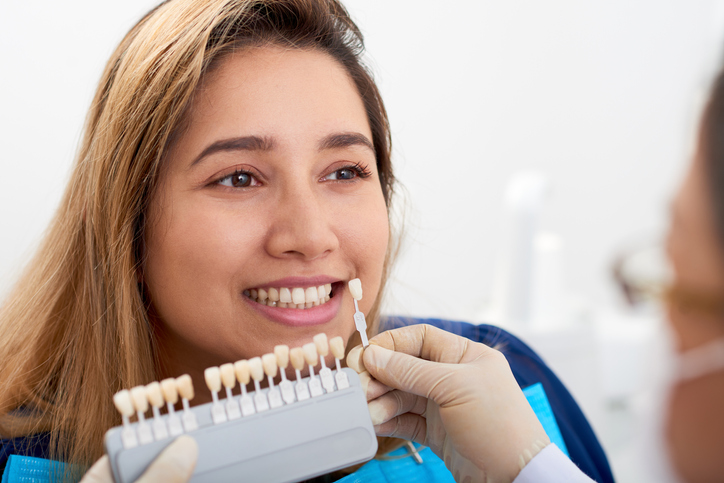
Veneers and dental crowns have many similarities. They’re both designed to restore the look and function of your teeth, and they both do that by bonding to the surface of the tooth. There are some key differences between veneers and crowns, though, both in form and function.
The primary difference between the two is that while a crown covers the whole tooth, a veneer covers only the front of the tooth. To attach a crown, the dentist will remove any decay, but may also need to file down your natural tooth to make the crown fit. By contrast, only half a millimeter of enamel is removed to bond a veneer to a tooth. In order to be a candidate for veneers, a patient must have sufficient enamel so that a millimeter can be removed and enough will be left for the veneers to bond properly.
Both dental crowns and porcelain veneers can improve the appearance of your teeth. They’re custom-made to fit your teeth, and tinted to blend in with the surrounding teeth. Porcelain veneers can repair many dental imperfections, from chips and gaps to misalignment to stains, discoloration, and other issues. However, that’s the extend of what they do: improve the aesthetics of your mouth.
Crowns, on the other hand, provide strength and support to your teeth. They can protect teeth from further damage, often decreasing the likelihood of extraction. Veneers can sometimes be useful in increasing function and providing protection, but their primary purpose is cosmetic. When a tooth is in a serious state of disrepair, a crown is often necessary to salvage the tooth. Both crowns and veneers are made to last for decades and can be used with other dental procedures to provide you with the best possible smile.
So which option is the right one for you? If the tooth you want to repair is severely cracked or worn, or has a large filling, a dental crown will be the best option. If you just want to improve the shape and color of your teeth, veneers may be for you.
If you’re looking for a reliable dentist, look to Glenwood Premier Dental, where we believe that a healthy, confident smile is an important part of a happy and healthy lifestyle. Our staff of caring professionals offers a wide range of dental services, working to exceed our patients’ expectations, and provide the best possible service. We offer dental exams and teeth cleanings, implant dentistry, Invisalign, laser dentistry, teeth whitening, veneers, and more, using state of the art technology in a comfortable and friendly environment. If you’re looking for dental care in Hazlet, contact us through our website or call 732.264.4477.
-
Coping with Oral and Dental Health Changes As You Age
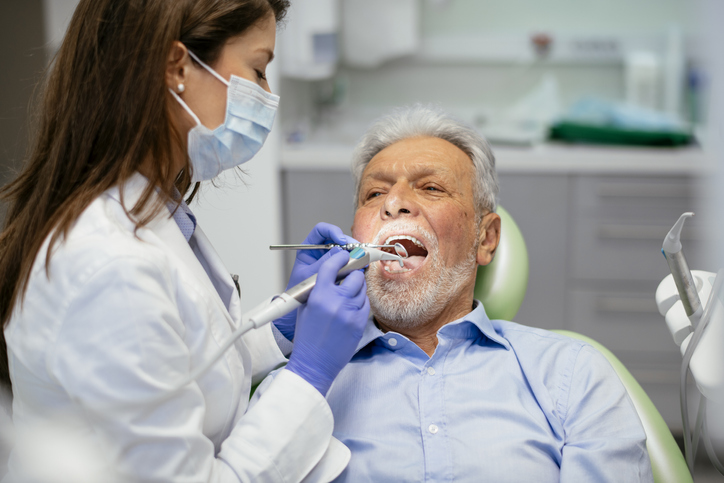
Good oral care should begin when you’re young and continue for a lifetime. If you’re struggling to maintain a beautiful smile as you age, you’re not alone. Consider the oral and dental health challenges that older adults face, along with helpful tips for keeping your smile healthy.
Age-Related Dental Problems
Your body and health changes when you get older, which makes you more prone to the following conditions:
- Cavities: Your cavity risk increases with age because dry mouth can cause cavities, and dry mouth is a common side effect of medications prescribed to treat age-related ailments. Before you start taking a new medication, ask your doctor if it causes dry mouth.
- Receding gums: Failing to brush and floss every day may cause your gums to recede as you get older.
- Aesthetic changes: Over the years, gravity causes overcrowding of the dental arches. Teeth shift and overlap, making them more difficult to clean. Pits, cracks, and chips caused by years of wear and tear also alter the appearance of your smile.
- Oral cancer: Tobacco and alcohol use can increase the risk of cancer in the mouth and throat. Years of partaking in these unhealthy habits may catch up to you when you get older.
How to Maintain a Healthy Smile as You Age
Getting older doesn’t mean you have to lose your teeth. Avoid tooth and gum problems with these tips:
- Brush and floss: Brush with fluoride toothpaste and a soft-bristled brush twice a day, and floss once a day. If you have arthritis, an electric toothbrush could be a more comfortable option. Floss picks, interdental brushes, and water flossers are also good alternatives to traditional floss.
- Clean your dentures: If you wear full or partial dentures, remove and clean them every night.
- Eat well: Sugar causes cavities no matter your age. Avoid sweets and eat more fruits and vegetables to minimize tooth decay and oral cancer risk.
- Check your mouth for anything unusual: If you see white splotches, lesions, or other concerns, have them checked out. It’s probably nothing, but if it’s oral cancer, catching it early is vital for treatment to be effective.
- Monitor your overall health: The body and the mouth are intricately connected. Keep an eye on all aspects of your health to keep your mouth and body healthy.
- Quit smoking and drinking: Strive to give up bad habits like drinking, smoking, and chewing tobacco to preserve healthy teeth and gums.
- Visit the dentist: A routine cleaning two to four times a year can do wonders for your smile as you age. It’s also an opportunity to find and correct problems early to avoid losing your teeth.
You’re never too old to have a beautiful, healthy smile! If you’re concerned about your teeth and gums as you get older, contact Glenwood Premier Dental at (732) 264-4477 to schedule an appointment. We offer the restorative treatments you need to get your smile back on track.
-
3 Reasons Good Dental Hygiene Is So Important

You hear it all the time: good dental hygiene is crucial. What you might not know, though, is why it’s so important. Here, we offer three compelling reasons to take good care of your teeth.
- Good dental hygiene helps keep your teeth healthy. This one may seem obvious, but it’s an important fact. Whether or not you get cavities is partially dependent on your genetics, but when you brush, floss, and rinse daily, you’re doing your part to keep your teeth and gums healthy. Brush your teeth twice a day and floss and rinse at least once, to remove plaque, prevent tooth decay, and stimulate your gums.
- Regular dental visits can provide disease detection. When you go every six months, your dentist can discover issues that affect more than just your mouth. With a thorough examination, many problems and diseases can be detected, including vitamin deficiencies, acid reflux, tooth grinding, diabetes, osteoporosis, heart trouble, dementia, oral cancers, and even mental health issues.
- When you care for your mouth, you prevent disease in your whole body. When your mouth is infected, that infection can spread and lead to bigger health concerns than cavities. For instance, gingivitis, a common inflammation of the gums, can turn into periodontitis, which can cause tooth loss. Infections that spread from your mouth have been linked to issues like asthma, arthritis, premature birth and low-birthweight babies, respiratory ailments, coronary artery disease, and stroke. Left untreated, tooth and gum disease can even be fatal.
So what do you need to do to reap all of the benefits of good dental hygiene? Start by eating a nutrient-dense diet and avoiding snacks full of sugar and processed carbohydrates. Don’t smoke or use any other tobacco products. Rinse your mouth out after each meal, or chew sugarless gum. Brush your teeth for two minutes, twice a day, using a medium-bristled brush, fluoride toothpaste, and small, circular, back and forth motions. Floss at least once a day, and rinse with an anti-microbial fluoride mouthwash. Finally but perhaps most important of all, see your dentist every six months for a cleaning and exam.
If you’re looking for a dentist in Hazlet, New Jersey, you can trust Glenwood Premier Dental to meet your needs. At Glenwood Premier Dental, we believe that a healthy, confident smile is an important part of a happy and healthy lifestyle. Our staff of caring professionals is committed to offering a wide range of dental services, exceeding our patients’ expectations, and providing the best possible service. We offer dental exams and teeth cleanings, implant dentistry, Invisalign, laser dentistry, teeth whitening, veneers, and more, using state of the art technology in a comfortable and friendly environment. If you’re looking for dental care in Hazlet, contact us through our website or call 732.264.4477 for more information.
-
Four Simple Daily Steps Can Lead to Better Overall Health
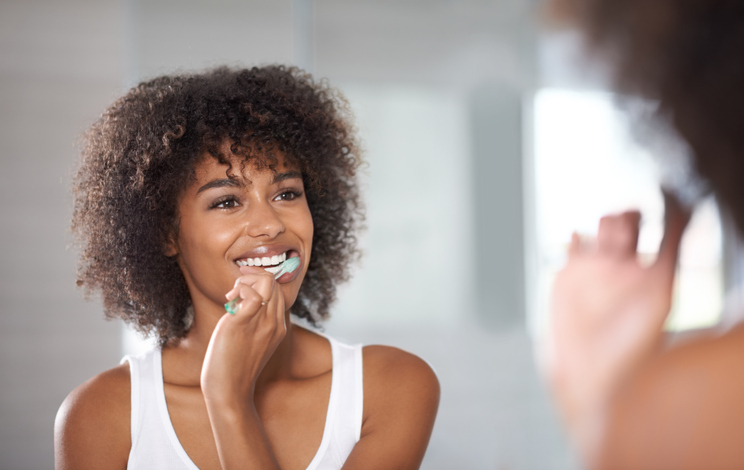
Are you paying enough attention to your oral health? It might surprise you to learn that caring for your mouth can lead to better health for your entire body. It’s easier than you think, too! The American Dental Hygienists’ Association (ADHA) has come up with a slogan to help you remember four simple steps you can take every day to improve the health of your mouth and by extension, your whole body: “Brush, Rinse, Floss, Chew.”
- Brush: Twice a day, brush your teeth with a medium bristle toothbrush, brushing for two minutes, using small, circular, back and forth motions. Use a toothpaste with fluoride, and look for one with the American Dental Association (ADA) stamp of approval. Don’t forget to brush your tongue!
- Rinse: After brushing, rinse your mouth with anti-microbial mouthwash. Look for mouthwash that contains fluoride and has the ADA seal of acceptance, and swish it around your mouth for 30 seconds so that it has a chance to come into contact with all of your teeth. Finish up with a gargle to rinse the back of your tongue, then spit the mouthwash into the sink.
- Floss: At least once a day, floss. After working the floss between the teeth with a gentle zig-zag motion, wrap it gently around the side of each tooth and slide it up and down, against the tooth surface and under the gum line. This will remove leftover food particles and plaque, and help prevent gingivitis (gum disease), which has been linked to health conditions like heart disease and diabetes. Be thorough but gentle, and if you have trouble handling traditional floss, talk to your dentist about the other options for flossing your teeth.
- Chew: Did you know that chewing sugar-free gum is actually good for the health of your mouth? It stimulates the production of saliva, which is the body’s natural defense against tooth decay. Research indicates that the biggest benefit to your oral health comes from chewing sugar-free gum after eating or drinking.
Of course, one of the best things you can do for your oral health is to schedule regular checkups with your dentist. If you’re looking for dentist in Hazlet, New Jersey, you can trust Glenwood Premier Dental to meet your needs. At Glenwood Premier Dental, we believe that a healthy, confident smile is an important part of a happy and healthy lifestyle. Our staff of caring professionals is committed to offering a wide range of dental services, exceeding our patients’ expectations, and providing the best possible service. We offer dental exams and teeth cleanings, implant dentistry, Invisalign, laser dentistry, teeth whitening, veneers, and more, using state of the art technology in a comfortable and friendly environment. If you’re looking for dental care in Hazlet, contact us through our website or call 732.264.4477 for more information.
-
Selecting the Right Electric Toothbrush
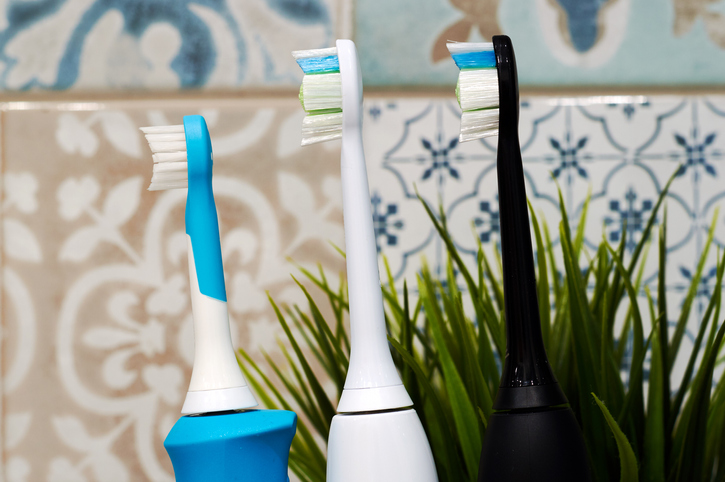
You know that brushing your teeth for two minutes twice a day with fluoride toothpaste helps protect your oral health, but do you know which toothbrush is the most effective? According to a recent study, electric toothbrushes do a much better job of cleaning your teeth and gums than manual toothbrushes. If you’re not using an electric toothbrush, you might want to consider making the switch.
The study took 11 years to complete, and it’s the longest study into the effectiveness of electric versus manual brushing ever undertaken. It reinforces what smaller studies have been saying all along. Electric toothbrushes are very effective at removing plaque, especially if the toothbrushes have oscillating heads that rotate in both directions. Over the 11-year period of research, using electric toothbrushes resulted in 22 percent less gum recession and 18 percent less tooth decay.
Now that we’ve sold you on electric toothbrushes, how do you choose the right one? There are many different toothbrushes on the market, and in some ways, your choice will be subjective: the one you like is the one you’ll be most likely to use, so that’s the best one for you. However, we do have a few guidelines to bear in mind.
- Your toothbrush should be easy to operate. It should run smoothly and consistently, and not require extensive instructions.
- The head of the toothbrush should be a good fit for your mouth. It needs to fit comfortably into your mouth and be easy to maneuver around your teeth. It also needs a long enough handle for you to reach the very back of your mouth while you hold it comfortably in your hand.
- Bristles matter. Bristles that are too hard can wear down your tooth enamel, so go for soft or medium bristles, depending on how vigorously you brush. Look for bristles with rounded tips for further tooth protection.
- A timer is important. Whether you use a manual or electric toothbrush, you should be brushing for two minutes. A toothbrush that times you for two minutes, in 30-second intervals, makes this easier.
- Weigh the cost of a rechargeable against the cost of batteries. Rechargeable models are typically more expensive, but they also garner better reviews. Battery-operated toothbrushes are less expensive initially but may require replacement batteries every couple of weeks.
For dental care in Hazlet, New Jersey, you can trust Glenwood Premier Dental. At Glenwood Premier Dental, we believe that a healthy, confident smile is an important part of a happy and healthy lifestyle. Our staff of caring professionals is committed to offering a wide range of dental services, exceeding our patients’ expectations, and providing the best possible service. We offer dental exams and teeth cleanings, implant dentistry, Invisalign, laser dentistry, teeth whitening, veneers, and more, using state of the art technology in a comfortable and friendly environment. If you’re looking for dental care in Hazlet, contact us through our website or call 732.264.4477 for more information.
-
7 Oral Hygiene Hacks for A Healthier Smile

When we think about oral hygiene, our minds go to brushing, flossing, rinsing, and seeing a dentist. These are indisputably important, but often, we don’t think about smaller steps that can make a big difference. Did you know that your mouth has one of the most diverse microbiomes in the entire body? It’s home to not just bacteria but also fungi, protozoa, archaea, and viruses. Fortunately, there are some simple “hacks” you can incorporate that will boost your oral healthcare, supplementing your brushing and flossing.
- Scrape your tongue. Have you heard of a tongue scraper? It’s a simple tool designed to clean the surface of your tongue, removing bacteria that can cause bad breath.
- Be cognizant of bruxism. Bruxism, or teeth grinding, can happen at night or during the day, but whenever it happens, it wears down your teeth. If you know you grind your teeth during the day, try some mind-body exercises to help you stop. If you suspect bruxism at night, consider getting a mouth guard to protect them.
- Increase your intake of foods that decrease the bacteria in your mouth. You know that sugar is not good for your teeth, but are you eating enough healthy food that will protect them? Nuts, legumes, fruits, and vegetables will help keep your teeth healthy and apple cider vinegar can remove harmful bacteria from your mouth.
- Rinse the right way. Using mouthwash at least once a day helps your mouth in three ways: it reaches places in the mouth that brushing and flossing can’t, reduces the level of acid in the mouth, and re-mineralizes the teeth. To properly rinse, swish it around your mouth for 30 seconds and then gargle to reach the back of your tongue.
- Use baking soda for brushing. Incorporate baking soda into your brushing routine once or twice a week, to remove stains and whiten teeth.
- Divide your flossing. Splitting your flossing between different parts of the day can help you get it done if you have trouble making time for this important step.
- Drink more water. Staying hydrated is important for every system in your body. When you rinse your mouth with water, you remove food particles that lead to tooth decay.
If you’re looking for a dentist in Hazlet, New Jersey, you can trust Glenwood Premier Dental to meet your needs. At Glenwood Premier Dental, we believe that a healthy, confident smile is an important part of a happy and healthy lifestyle. Our staff of caring professionals is committed to offering a wide range of dental services, exceeding our patients’ expectations, and providing the best possible service. We offer dental exams and teeth cleanings, implant dentistry, Invisalign, laser dentistry, teeth whitening, veneers, and more, using state of the art technology in a comfortable and friendly environment. If you’re looking for dental care in Hazlet, contact us through our website or call 732.264.4477 for more information.
-
Understanding Cavities

You know, of course, that you should take good care of your teeth so that you won’t get cavities, but what do you actually know about cavities? They don’t always have symptoms, so are they really that big of a deal? The truth is, cavities should be taken seriously, because they are permanently damaged areas of your teeth. Understanding cavities can help you avoid them, for a healthier mouth and body.
- What, exactly, are cavities? Cavities are areas of your teeth that have been permanently damaged by decay.
- What causes cavities? A variety of things contribute to cavities, but ultimately, they’re caused by germs. The germs that cause cavities are infectious and can be spread by sharing food, utensils, or by kissing. Sugar plays a big role in the formation of cavities; sugary food feeds the bacteria in your mouth, forming acids that eat away at your teeth. Germs then get into the holes worn into your teeth, causing cavities. The sugars that impact your teeth don’t just come from candy and soda, but also from high-carb foods and sticky foods. If you’re going to snack, it’s best to choose fruits, vegetables, cheese, and nuts, and drink water.
- Do adults get cavities? You may associate cavities with childhood, but in fact, there are no age restrictions on tooth decay. In fact, cavities can happen as early as the first tooth, and you can get them throughout your life.
- Do cavities hurt? In the beginning stages of a cavity, people often have no symptoms. If it goes untreated, though, it can cause pain and tooth sensitivity.
- Is it really necessary to fix a cavity that doesn’t hurt? Absolutely! If cavities are not treated, they can affect deeper layers of your teeth, causing severe pain, infection, and tooth loss. It’s far better to treat a cavity early than to require a root canal later.
- What can you do to prevent cavities? Eat a healthy diet, steering clear of sugary foods and beverages, and loading up on fruits and vegetables. Brush your teeth at least twice a day, flossing at least once a day, and finishing off with an antibacterial rinse. It’s also extremely important to see your dentist every six months, for a checkup and a cleaning.
At Glenwood Premier Dental, we believe that a healthy, confident smile is an important part of a happy and healthy lifestyle. Our staff of caring professionals is committed to offering a wide range of dental services, exceeding our patients’ expectations, and providing the best possible service. We offer dental exams and teeth cleanings, implant dentistry, Invisalign, laser dentistry, teeth whitening, veneers, and more, using state of the art technology in a comfortable and friendly environment. If you’re looking for dental care in Hazlet, contact us through our website or call 732.264.4477 for more information.
-
Fruits and Vegetables Can Help Prevent Oral Cancer

You hear it all the time: you need to fill your diet with fruits and vegetables. Every system of your body benefits from the nutrients found in produce, from your heart to your digestive system to your skin. But do you know how important eating well is for your oral health? There’s even evidence to indicate that fruits and vegetables can help prevent oral cancer.
Oral cancer is a very serious disease, and about 8,000 Americans die of oral cancers each year. For over five decades, research has been conducted on the relationship between fruit and vegetable consumption and the risk of oral cancer, in more than 40 epidemiologic studies. This research has produced strong evidence that a diet full of vegetables and fruits, especially citrus fruit, can help protect against oral cancer.
This protection is due to a wide range of nutrients found in produce. In addition to vitamins like C and E, fruits and vegetables contain phytonutrients that can help prevent cancers. Berries, for example, are high in ellagic acid, and cruciferous vegetables like broccoli, cauliflower, cabbage, and Brussels sprouts have isothiocyanates and glucosinolates. Anti-oxidants like beta-carotene, found in carrots, leafy greens, sweet potatoes, and peppers, also have powerful cancer-fighting properties.
To gain the full benefit of these nutrients, incorporate a minimum of five servings of fruits and vegetables into your diet each day. Other measures you can take to help prevent oral cancer include eating vitamin D-rich foods like eggs, foods with omega-3 fatty acids, like salmon, and foods that contain probiotics, like yogurt and certain cheeses. Don’t use tobacco, limit your alcohol consumption, and see your dentist regularly. Your dentist will be able to help you keep your mouth healthy, and can also identify early signs of oral cancer so that it can be treated effectively.
If you’re looking for dentist in Hazlet, New Jersey, you can trust Glenwood Premier Dental to meet your needs. At Glenwood Premier Dental, we believe that a healthy, confident smile is an important part of a happy and healthy lifestyle. Our staff of caring professionals is committed to offering a wide range of dental services, exceeding our patients’ expectations, and providing the best possible service. We offer dental exams and teeth cleanings, implant dentistry, Invisalign, laser dentistry, teeth whitening, veneers, and more, using state of the art technology in a comfortable and friendly environment. If you’re looking for dental care in Hazlet, contact us through our website or call 732.264.4477 for more information.
-
Choosing a Dentist for Your Children
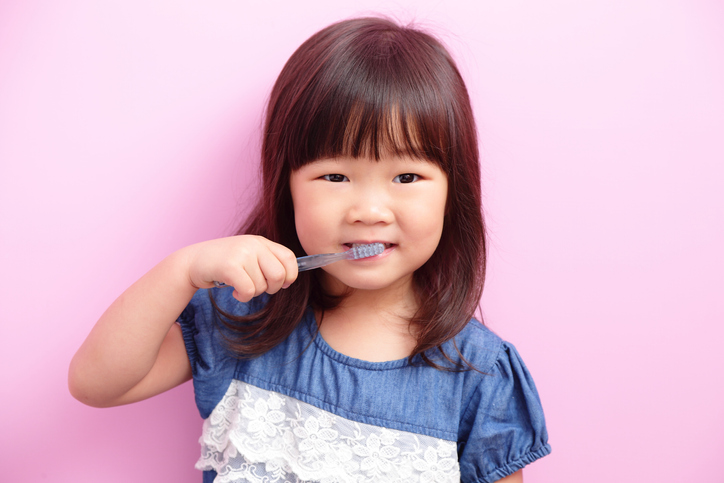
Experts recommend that children have their first dental visits almost as soon as they have their first teeth. For parents, though, choosing the right dentist for our children can be a nerve-racking experience. What’s the best way to go about choosing a dentist for your children?
It’s easy to understand why your child needs a dentist. It’s recommended that children see a dentist as early as possible, typically around one year of age. Current research indicates that babies can have cavity-causing bacteria in their mouths before their teeth even erupt from the gums, so taking care of their mouths should be a high priority even before they have teeth. The dentist will examine your child’s mouth, but will also give you valuable information about how best to care for his or her oral health. Additionally, when you take children to the dentist regularly, they’re less likely to be anxious and will become more comfortable dental patients. But which dentist do you choose?
Some parents prefer a pediatric dentist. Pediatric dentists get up to three years of specialty training under their belt after they finish dental school, and they work exclusively with children. They know how to manage the behavior of children, even very young kids, and they can manage unique situations like trauma or serious tooth decay. They also tend to create an atmosphere that’s fun for kids, with TVs, games, and a staff trained to effectively calm and communicate with young children.
On the other hand, you might want to bring your child to your family dentist. Many parents feel more comfortable bringing their children to the same dentist that they see, because they’re more familiar with the dentist, the staff, and the office policies. Family dentists know how to provide care to people of all ages, and they make accommodations to keep kids comfortable during their visits.
Regardless of which kind of dentist your children are seeing, make sure you’re doing everything you can at home to promote healthy mouths. Before teeth erupt, wipe the gums clean with a cotton ball, and once the teeth come through you can wipe them with a damp washcloth or baby-sized toothbrush. Use fluoride toothpaste, but use it sparingly for young kids, because they may not be able to spit very well yet. Teach your kids to brush and floss regularly, and minimize sugar in their diets.
If your child needs a dentist, trust Glenwood Premier Dental. We believe that a healthy, confident smile is an important part of a happy and healthy lifestyle, and our staff is committed to offering a wide range of dental services, exceeding our patients’ expectations, and providing the best possible service. We offer dental exams and teeth cleanings, implant dentistry, Invisalign, laser dentistry, teeth whitening, veneers, and more, using state of the art technology in a comfortable and friendly environment. If you’re looking for dental care in Hazlet, contact us through our website or call 732.264.4477.
